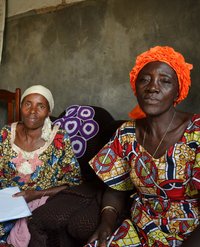How the transformative SASA! approach prevents violence against women and girls

This change expresses itself in many ways. The young man in a motorbike workshop discussing a poster about partnership violence with his friends. The female journalist writing an article about survivors. The priest who welcomes the SASA! team into his church, announcing: “I am one of you!”
SASA! is an approach that questions norms. By doing this, it can bring about changes in society. The objective is to achieve gender justice and an end to violence against women. The approach is put into action by volunteers who act as role models.
„The idea is to empower people to critically examine unequal power relations between men and women and in this way provide impulses for changing those power relations.“
Action in the neighbourhood
Sasa means “now” in Kiswahili. The transformation into a society without violence against women can – and must – take place now. The initiators of the approach are convinced of this. They are the members of the Ugandan organisation Raising Voices and the volunteer activists who are taking the approach into their communities. How? The answer to this also lies in the four letters of the name SASA, which stand for the four phases of the approach: Start – Awareness – Support – Action.
The four phases of SASA! Together
The SASA! activists break the taboo of silence on the issue of violence against women, raising public awareness within their community of the unequal power relationships between men and women.
At the community levels, offers of support are created, for example for women affected by violence.
Women and men, but also institutions such as healthcare clinics and church congregations, start to become active against violence, standing up for those affected.
The SASA! process begins with the members of the community who would like to work towards an end to violence against women. In workshops they find out how they can best question the power relationships in their society. Afterwards they can put these methods into action in their communities. They knock on the doors of their neighbours. They hand out flyers at the market. They post on social media. They hold discussions with the village elders in the shade of the baobab trees. Measures are also taken to ensure increased awareness of the issues among journalists, teachers, heads of Christian and Muslim faith communities, healthcare workers and the police. It works like a positive snowball, gathering momentum. Gender-equitable values are advocated as a joint effort – which ensures they remain respected in the long term.
SASA! - Working together to end violence against women
The SASA! approach was developed in 2008 by the Ugandan non-governmental organisation Raising Voices. It was originally applied to combat HIV and then further developed into SASA! Together, which now has a focus on violence against women. medica mondiale partner organisations in Liberia, Burundi and the Democratic Republic of Congo have already adopted this approach. And our Ugandan partner organisation MEMPROW began to use SASA! Together in 2023.
„SASA! Together is an impressive demonstration of the long-term impacts which can be achieved by local solutions. The approach influences the attitude and behaviour of community members, and also of the staff at public institutions. This is crucial in the struggle against sexualised violence.“



